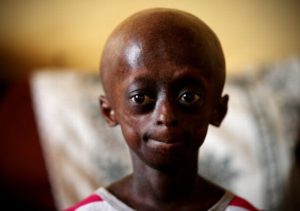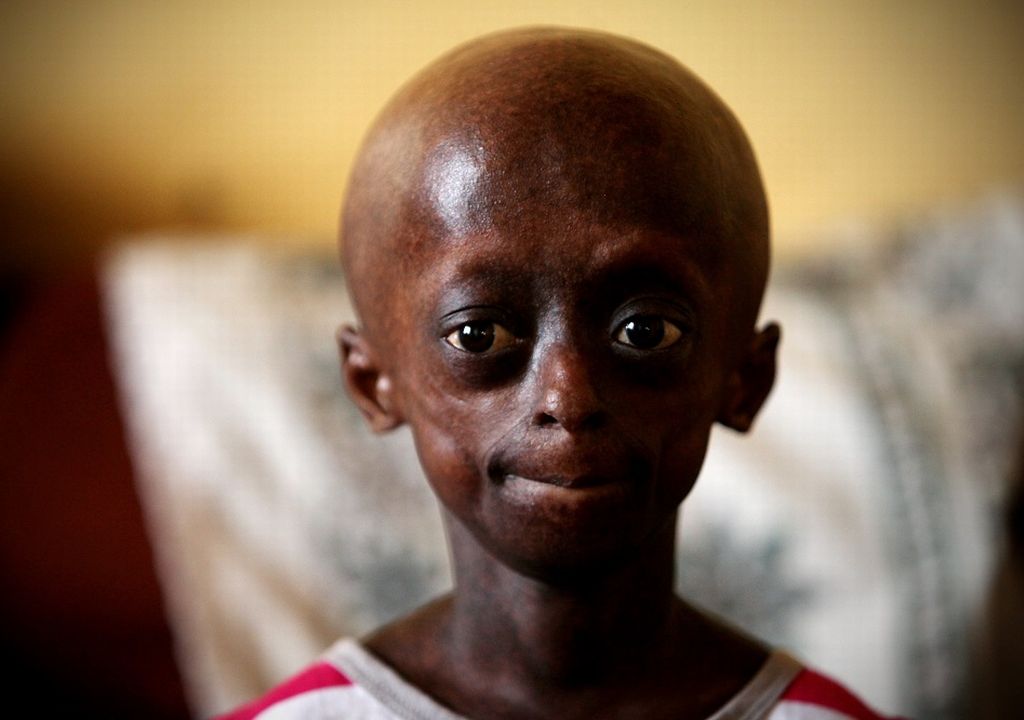
She was only 12 years of age when I first learnt about her. I was preparing for a test that week, and a friend of mine told me that a 3rd Degree episode airing on E-TV that day was not to be missed. He said that it was about a teenage girl who lived inside a 60-year old’s body. I dropped everything that evening, already visualizing how the episode will be. In my mind I thought “this is probably one of those pattern formed astonishing Fringe episodes”. But to my amusement the whole episode grabbed my attention and touched my heart, and somehow changed my perception on life. I was so humbled by the young girl, in fact I fell in love with her and wouldn’t stop telling people about her, her outspoken self and her courage.
A medical miracle, Ontlametse Phalatse was diagnosed with progeria a rare and fatal genetic condition that accelerates the aging process. Her body was aging six times faster than normal, and she was told that she would probably not live past 13. Because of progeria she experienced limited growth across the whole body. Sufferers of progeria often share distinctive features including a narrow nose, a small jaw and a large head in relation to their body. Health issues associated with it have a lot in common with illnesses often suffered by the elderly, including loss of eyesight, kidney failure and heart problems. Wrinkled skin, hair loss and small, frail bodies add to their old appearance, but sufferers do not experience the mental or motor deterioration associated with normal ageing.
When she enrolled in primary school she was often scorned by classmates, teachers and others who thought she was so small and skinny because she had AIDS. The vicious discrimination and stigma against her was sometimes unbearable for her and her family. But she grew so much courage through it all, more than anything she started believing in herself and at the same time acknowledging that there is a reason she was different from all the other kids. She also embarked into being a motivational speaker as well as an icon of courage and hope.
The First Lady was such an incredible being. She called herself the first lady because she was the first African to be diagnosed with this diseases. She lived past 13 years and died recently at the age of 18.
I feel compelled to repeat Steve Jobs’ words when he said
“Death is very likely the single best invention of life…Your time is limited, so don’t waste it living someone else’s life…Don’t let the noise of others’ opinions drown out your own inner voice. And most important, have the courage to follow your heart and intuition.”
I think he articulated this in the simplest way. Ontlametse chose to take each day as it came, she accepted herself and understood that being different didn’t make her any less of who she was. She really didn’t care about what people thought of her, but she cared about what she can give out to the world.
I think we can learn a few things from this brave young girl. We focus so much on how we look, and we don’t realize that our appearances don’t define who we are. What defines who we are is our purpose, what we are meant to bring here, and how many lives we will impact while we are here. She acknowledged that her lifespan was very short, and knew that each and every single day she took a breath was a miracle. She really lived each day like it was her last. Like a flower she came and provoked the feelings of love and happiness in our hearts. The power of her existence should really challenge us in almost every aspect of our lives. Although she went through a lot of physical and emotional pain, she was consistently bubbly and outspoken and happy. We will encounter difficulties at some point in our lives, but that should never distract us from living to the fullest and being happy. We need to continuously work on loving ourselves, because we will develop an internal power that no one can ever take away from us.
Rest in peace Ontlametse and thank you for making us realise that there is more to life than what societal norms place upon us … There is more, you are more.
[ABTM id=6652]
